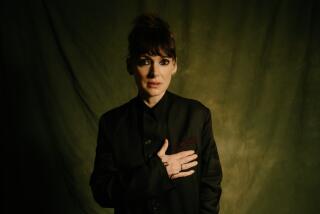Little Red Ridinghood Gets a Hungarian Twist
- Share via
MONTREAL — It’s a gray, foreboding afternoon on a recent Sunday. Hungarian director Marta Meszaros and her crew have set up shop on the 18th floor of an office building in this Canadian city, tilting their camera through a Plexiglas window toward the distant street. There, practically in miniature, a half-dozen extras cluster on a curb, ready to cross on cue. On a diagonal corner, barely discernable, a silver, slithery, four-legged creature also waits, poised for action.
It’s the Wolf--the canine character in Meszaros’ “Little Red Ridinghood, Year 2000,” her contemporary re-telling of the classic fairy tale that has a haunting connection to her own childhood during the Stalinist purges.
“Maybe we should zoom in?” suggests a French Canadian camera assistant, worried that the Wolf won’t be seen from so far up. “I don’t think there’s enough available light.”
“A zoom is not a good idea,” director Meszaros barks in French. “And of course there’s enough light.”
The commanding Meszaros, age 56, prevails. Orders are transmitted through walkie-talkies for “Action!” below. The camera rolls, and the extras walk into the diagonal cross path. Then the Wolf crosses too. Its nose and tail to the ground, its ears erect, creeping past them. Even from 18 floors above, it’s eerie: the archetypal folkloric wilder-than-wild forest creature, out there in the Modern City.
For two decades, Meszaros’ stern, uncompromising pictures of daily life in Eastern Europe have won countless film festival awards, and have been lauded at women’s cinema gatherings, without quite convincing a mainstream audience. “Ridinghood,” her first North American and her most commercial effort, may bring her a wider audience. And she has been offered a complete film retrospective in Moscow and Leningrad this spring. Prior to glasnost, none of her movies, pointedly critical of Stalinist regimes, have been allowed in the Soviet Union.
Being shot in English, “Little Red Ridinghood, Year 2000” has Ridinghood’s divorced mother as an urbane meteorologist transfered to an outpost in the forest. The first Canadian-Hungarian co-production, it is projected for theatrical release in the United States in early 1989.
After the shot, the Wolf--really a malamute painted Tin Man silver--arrives by elevator, wagging its tail. “Nice Mookie,” Meszaros says soothingly, stroking the big Canadian dog. Originally, a Hungarian German shepherd had been tried out, and failed, for the Wolf. The two-country contract actually called for “a Hungarian dog.”
“It’s a co-production,” Meszaros shrugs, and laughs.
For years, Meszaros has wanted to do a Red Ridinghood film. As a child, she adored the Grimm Brothers’ version, in which the hunter rescues Ridinghood and her grandma from the belly of the Wolf. As an adult, she read it to her equally enthralled children. But Meszaros has a special connection to this tale of a fatherless adolescent thrust out into a hostile world, declaring: “I think all my movies are about little girls who try to get to the other side of the forest unscathed.”
As she showed vividly in her autobiographical film, “Diary for My Children,” a 1984 release, her parents were whisked away from her in early childhood, and died as victims of Stalin’s purges. Orphaned at the end of World War II, Meszaros was raised, against her will, by a woman in Budapest who was a loyal communist bureaucrat. The young Meszaros rebelled. She often skipped school and went to the movies. And she dreamed forever about her deceased parents, especially her sculptor father.
“Children who have lost their parents fantasize what they look like,” Meszaros explains. “These are the most profound relationships we have in our lives. We idealize. Since I don’t know my father, I can give him any face I want.”
In “Diary for My Childhood,” Meszaros had actor Jan Nowicki portray both the child’s vision of her father and also the real-life communist partisan whom the girl loves. In “Red Ridinghood, Year 2000,” Nowicki plays Ridinghood’s missing father, who has run away with a trapeze artist, and also the rescuer hunter in the forest. Finally, Nowicki’s eyes will be transposed on the face of the Wolf, who is good-bad in Meszaros’ version, and a “father figure” too.
The Freudian crisscross gets even more complicated. Nowicki, a Polish veteran of 80 films, is Meszaros’ longtime off-screen boyfriend as well. “It’s not because I live with Jan, but I think only Laurence Olivier is like him on stage,” Meszaros insists. Nowicki has appeared in all her films for the last 12 years, the most intense symbiotic relationship between a male star and his female director since the mid-1970s heyday of Lena Wertmuller and Giancarlo Giannini.
Indeed, “Ridinghood, Year 2000” is a Meszaros “family affair.” The second-unit cinematography is handled by her stepson, Nyika Yancso. Many of the crew are old pals from Hungary, including Thomas Vamos, the director of photography, who immigrated to Canada 25 years ago. And it’s hardly unusual to see others of Meszaros’ clan buzzing about the informal set. Those who were on the Budapest part of the shooting recall a possible women’s “first” for feature film making: Meszaros directing one afternoon with a granddaughter planted on her knee.
How informal is she? At Montreal’s Dorval Airport, Meszaros photographs Red Ridinghood and her mother buying airplane tickets for their forest destination without even informing the extras behind them that the camera is running. When she shoots a bedroom scene with a camera-shy 6-year-old Red Ridinghood, Meszaros chats away with her crew while Pamela Collyer, the actress playing the mother, directs the little girl, Theresa Hart. Calms her down. Gives her alternate lines and motivation. “Play with the lamb’s nose and think of daddy left behind,” Collyer coaxes her.
How informal is Meszaros’s casting? She found actress Collyer on Montreal TV. Collyer is the genial woman in a leotard on CFCF’s Good Morning Workout, which the full bodied, ponytailed Meszaros attempts every day, between cigarettes.
“Ridinghood” is the eighth entry in Quebec producer Rock Demers’ ambitious “Tales for All” package of family films, three pictures a year utilizing contemporary settings, children as protagonists and international directors and crews. Demers’ first film in the ensemble, “The Dog That Stopped the War” (1984), was released by Miramax in the United States, and two others, “The Peanut Butter Solution” and “The Great Land of Small” opened in the Midwest through New World Pictures. But Demers is the first to admit that, despite video and cable success, the films have yet to catch on theatrically in America, despite 45 international awards at film festivals.
Again, the hope is that “Ridinghood” could be the breakthrough.
“A great hit? I never think about it,” Meszaros says, chomping an A & W Teenburger at Dorval Airport during a lunch break. “ ‘Little Red Ridinghood’ is an international story, and maybe it will touch many people. I do know that European children will be interested in such a story. But Americans like very strong action, like Arnold Schwarzenegger. And there’s American TV, which I watch for my English language. It’s really something. From 8 a.m. to 1 a.m.: thrillers, aristocracy, minorities, hotel stories, homicides. It’s like a dishwasher! But it’s not for people who have brains. It’s killing literature, culture--and movies too.
“American TV is like Soviet propaganda. There in Russia, it’s openly ideological: I love communism, socialism, building a new country. In America, it’s I love war, violence, money. And ‘Dynasty’ is to me like Dostoevsky--about terrible people.”
More to Read
Only good movies
Get the Indie Focus newsletter, Mark Olsen's weekly guide to the world of cinema.
You may occasionally receive promotional content from the Los Angeles Times.










